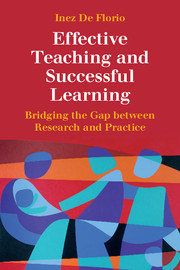Book contents
- Frontmatter
- Epigraph
- Contents
- Preface
- Introduction
- 1 Main Features of Scientific Research on Education
- 2 Important Types of Scientific Research on Education
- 3 Main Features of Evidence-based Research on Education
- 4 Meta-Analyses on Education
- 5 A Synthesis of Over 800 Meta-Analyses Relating to Achievement
- 6 Scaffolding Effective Teaching and Successful Learning
- 7 Planning and Starting the Lesson
- 8 Presenting Knowledge and Skills – Assertive Questioning
- 9 Guided and Independent Practice
- 10 Cooperative and Project-based Learning
- 11 Feedback – Reciprocal and Informative
- Concluding Remarks: Standards Need More Evidence
- References
- Index
11 - Feedback – Reciprocal and Informative
Published online by Cambridge University Press: 05 June 2016
- Frontmatter
- Epigraph
- Contents
- Preface
- Introduction
- 1 Main Features of Scientific Research on Education
- 2 Important Types of Scientific Research on Education
- 3 Main Features of Evidence-based Research on Education
- 4 Meta-Analyses on Education
- 5 A Synthesis of Over 800 Meta-Analyses Relating to Achievement
- 6 Scaffolding Effective Teaching and Successful Learning
- 7 Planning and Starting the Lesson
- 8 Presenting Knowledge and Skills – Assertive Questioning
- 9 Guided and Independent Practice
- 10 Cooperative and Project-based Learning
- 11 Feedback – Reciprocal and Informative
- Concluding Remarks: Standards Need More Evidence
- References
- Index
Summary
Whereas for many decades feedback for students consisted only of scoring and grading, in recent times different forms of feedback have become increasingly important. Nowadays, educationalists as well as practitioners are convinced that adequate feedback is decisive for learning progress. In this discussion, two main developments have to be considered.
On the one hand, educational research led to a growing corpus of results differentiating between various forms of feedback. As far as experimental research is involved, significant findings show what types of feedback may work in different teaching and learning contexts. On the other hand, standards-based education brought quite different discussions about feedback to the fore. Teachers have to be well informed about these internal and external forms of feedback if they don't want their students and themselves to be torn between two – at times, contrasting – aims of teaching and learning. In my view, Interactive Whole-class Teaching is able to provide helpful compromises between contrasting aims of feedback.
Deliberate practice has to consider and evaluate different forms of feedback, which vary from a sign like thumbs up to unspecified praise, from “well done” to a differentiated indication of the steps already taken during the precedent learning processes. So we will take a closer look at different expressions used by teachers to inform students about how to improve their learning.
Recent research is not at all limited to analysis of feedback in order to show which form of information given to the students may work best in a special learning context. It is no longer only for the teacher to provide feedback. In introducing and practicing collaborative and cooperative forms of learning, feedback given by peers is of growing importance. As the majority of this feedback type is false – Nuthall (2007) indicates a deficit rate of about 80 percent – students have to be trained again and again so that peer feedback reaches the positive effects it can have on cognitive achievement and other educational goals.
In my view, a third form of feedback is still more significant: It is the feedback teachers might be able to elicit from their learners. Until students are willing to express what works for them in a particular learning context, a long and arduous route to trust building has to be taken.
- Type
- Chapter
- Information
- Effective Teaching and Successful LearningBridging the Gap between Research and Practice, pp. 198 - 214Publisher: Cambridge University PressPrint publication year: 2016



